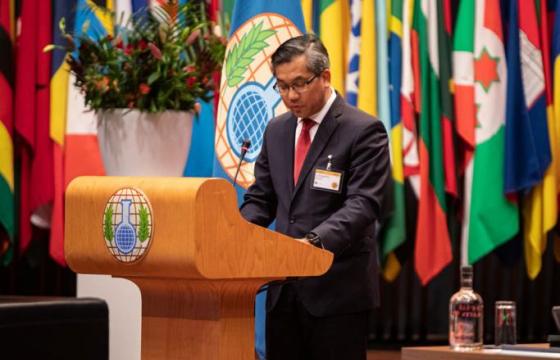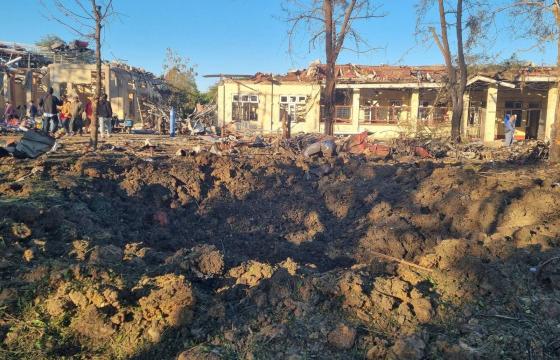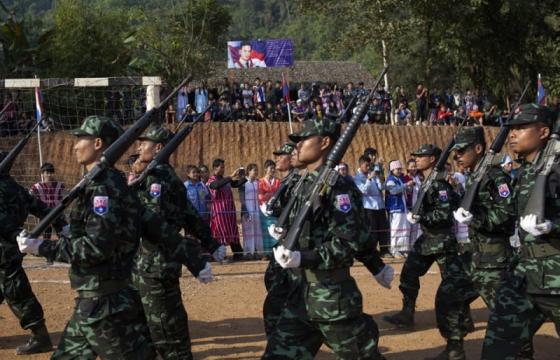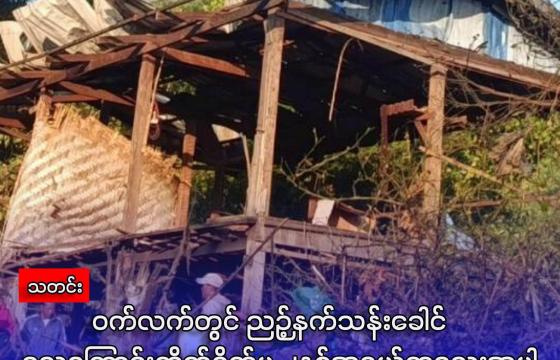At a forum held in Yangon to celebrate and discuss 70 years of India-Myanmar relations, a key message to come out being the need to substantially increase connectivity, trade and diplomatic relations between the two neighbours.
Parami Roundtable and Mizzima Media Group organised the first India-Myanmar Dialogue ‘Act East Policy and India-Myanmar Relations’ at Park Royal Hotel on 2 September 2017 to commemorate the 70 years of India-Myanmar relations.
The roundtable was attended by high level speakers from India and Myanmar. Mr Ken Tun, Chairman, Parami Energy Group, the main organiser and sponsor, extended the opening remarks. H.E. Mr. Vikram Misri, Indian Ambassador to Myanmar extended the special remarks. U Nay Oke, Professor of English gave the keynote address. The Book entitled “Myanmar's Integration with the World: Challenges and Policy Options”, jointly edited by Prabir De and Ajitava Raychaudhuri with contributions from several Myanmar scholars and published by Palgrave Macmillan, Singapore was also released at the roundtable.
The roundtable had two plenary sessions. The first session ‘Act East Policy and India – Myanmar Relations’ was chaired by Dr. V S Seshadri, Former Indian Ambassador to Myanmar Panellists. Speakers at this session were Dr. Zaw Oo, Executive Director, CESD-Myanmar, Yangon; Prof. Ajitava Raychaudhuri, Jadavpur University, Kolkata; Mr. SoeMyint, Editor-in-Chief and Managing Director, Mizzima Media Group, Yangon; U L Zau Goone, Member, Myanmar Institute of Strategic and International Studies (MISIS), Yangon; and Mr. Pratim Bose, Bureau Chief, Hindu Business Line, Kolkata. The second session ‘Challenges to India-Myanmar Relations and Way Forward’ was chaired by Dr. Myo Thant, Parami Roundtable Group, and panellists were Dr. Prabir De, Professor, RIS, New Delhi; Ms. Cho Tin Tun Kirkpatrick, Nova Southeastern University, Florida; Ms. Zin Zin Naing, Yangon University of Economics (YUE), Yangon; and Mr. Subir Bhaumik, Former BBC Correspondent and Author, Kolkata; and Advisor, Mizzima Media.
The organizers said they had a good opening session with Ambassador Vikram Misri giving an overall round up about the full gamut of India-Myanmar relations and his insights about the outlook for the future. Mr.U Nay Oke and Mr.Ken Tun offered their perspectives. The scholarly book edited by Professor Dr.Prabir De and Prof Raychaudhri on Myanmar again brings out the various developmental challenges and opportunities facing Myanmar and its integration with the region.
The forum took a look at India’s Look East Policy that is now the Act East Policy that was initially enunciated in 1992. This was at a time when India’s external economic ties were more directed towards the westerly direction. As India liberalised economically in 1991 it was also felt that the country needed to step up ties with the fast growing East and South East Asian region.
The evolution of this policy took many forms, in terms of India becoming part of regional and sub-regional mechanisms - with ASEAN itself from a sectoral dialogue partnership in 1992 to full dialogue and summit level relations, but also mechanisms like BIMSTEC, Mekong-Ganga Cooperation, etc. In the 2000 decade we also signed several FTAs with countries in this region-with ASEAN as a whole but also with Singapore, Korea, Japan and Malaysia.
As a participant noted, from India when one looks east it is Myanmar that we see first and here the other dimension of development of our own North East region of India plays a very important part. Many ethnic groups along our long border share kinship. And together the North Eastern states along with the contiguous states of Sagaing region or Chin state can mean larger economies of scale. Of course that could be facilitated by greater connectivity, not only physical connectivity, which is most important but also institutional, people to people level and so on. The question is how far the two countries have gone and what lies ahead.
Prabir De said they must thank the organisers for holding such a seminar on the eve of the forthcoming state visit of Prime Minister Modi to Myanmar. “High level visits have the potential to energise our relations and give it visionary directions. Many observations and suggestions we have heard today hold particular relevance in this regard. While the ties are already multi-sectoral and cover a wide span, we identified three specific areas as holding particular promise that need to be fully harnessed.”
One is the need to have more trade and investment relations. Bilateral trade is still quite small and not so diversified in both directions. On investments, both in manufacturing and in areas like energy, transport and infrastructure as also services, the scope is enormous. Participants suggested that Indian businesses will be attracted to the Myanmar growth opportunity if we can bring about greater awareness and also if they see an emerging climate of investment security and predictability.
Secondly, there is much work to do on connectivity, both in building that connectivity and in efficiently using it once it is established. Let us say by 2020 the Kaladan project with all its components and the Trilateral highway are in place, we will also need the software ready by then in the form of integrated customs stations with all the paraphernalia of single windows, trade and transit protocols, road transport and logistics linkages etc., to be in place. These take time for discussion and finalisation. And then businesses also have to be ready with their plans and investments along these corridors so that a transport corridor becomes a development corridor in a short span of time.
Capacity building for training and higher education including technical education is an area where India and Myanmar have been cooperating in a variety of areas for several years now. With the new government in Myanmar attaching even more importance to human resource development this can get further impetus.
Lastly, the cooperation and synergies that can be built between the North Eastern states of India and the Western or North Western states of Myanmar. Here, the connectivity will be important- road, and over a longer term even rail can be looked at-but so many more areas are possible- education including higher education, medical facilities including diagnostics, institutional networking, visiting each other’s festival- the Hornbill, the Naga new year and so on. The border region development cooperation programme that the two countries have had in the last few years could be further enriched and such initiatives could strengthen peace and development.
In terms of importance, participants of today’s roundtable have identified several projects in the areas of culture, commerce, connectivity and security which shall be considered by both the countries for implementation.
- Countries have to formalize the border trade and border connectivity projects (Moreh – Tamu in particular) have to be completed on urgent basis.
- Ongoing connectivity projects such as Kaladan multimodal transit transport project, Trilateral Highway, etc. must be completed by 2020. Extension of railway line from India’s Northeast to Myanmar shall be taken up by Indian government. Bilateral agreement shall be signed to promote coastal shipping with allowing each other’s vessels to ply in coastal areas. More air links between the two countries should be established. Delhi and Yangon should have direct flight. India’s Northeastern states should be connected with Myanmar’s Mandalay, Yangon or Bagan.
- Cultural connectivity is as important as physical connectivity. Participants suggested that India should offer more fellowship to Myanmar students to study in India.
- Greater awareness of India-Myanmar relations should be promoted through publications, think-tank networks, social media, media exchange, etc.
More bilateral cooperation is needed in health, tourism, education, early warning system for disaster management, etc. India should allow Myanmar patients to be treated at India hospitals on cost-effective basis. Visit to Bodhgaya by Myanmar nationals should be made cost effective so that many Myanmar nations can visit Bodhgaya. - Myanmar should allow Indian FDI in heath and pharma sector. India companies like Zydus Pharma is setting up plants in Thilawa. More Indian pharma companies should open branches in Myanmar. Myanmar’s membership in ASEAN is big advantage to Indian pharma companies to get higher market access in ASEAN and beyond. Similarly, Indian companies should open up hospitals chains such as Fortis, Apolo, etc. in Myanmar. Indian medical students with Chinese medical degree can be employed in Myanmar. This would ease the problem in health sector.
- India and Myanmar should cooperate in matters relating to non-tariff measures (NTMs). Compliance to Indian standards and certification would help Myanmar to facilitate exports of agricultural products such as pulses and beans.
- Myanmar should collaborate with India in science and technology, skilling, etc.
- A Joint Task Force shall be set-up by both the countries to deal with issues relating to current trade in pulses and beans. Both the countries have to sort of differences through negotiations.
- Both the countries should revitalize the activities of India-Myanmar border commission.
- Myanmar may consider setting up a new Centre for Act East Policy.
- Participants have identified several other projects such as Motor Vehicle Agreement, connecting energy grids, involvement of youth, joint courses in professional degrees and skill development, industrial parks, SEZs, etc.
All participants felt more track II dialogue should be organised to exchange opinions and free discussion.
Participants thanked Parami Energy and Mizzima Media for jointly hosting the event. The next roundtable will be held in Kolkata in early 2018.






